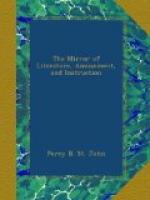* * * * *
CAMBRIAN CONVIVIALITY.
“Cloth must we wear,
Eat beef, and drink beer,
Though the dead go to bier.”
Old Ballad.
There is something refreshing, and not a little inspiriting, in the scanty relics of those hearty customs and pastimes which imparted such a manly tone to the character of our ancestors; but now, like the ruined castle, or the old ivied abbey, they have become objects of admiration rather than sources of delight. Fifty years ago, the inhabitants of North Wales, a rude and blunt race even now, were far less sophisticated by modern refinement than they are at present; and it was then a common matter for the Penteulu, or head of the family, to dine in the large stone hall of the mansion—he and his own particular friends at a table, raised on a Dais—and his numerous tenants and dependants at another table running the whole length of the said hall. Then came the wassailing—worthy of the days of Arthur—wine for the upper table; ale, medd, (mead,) and spirits for the other; and after all came the friendly contest at some manly game—wrestling, racing, pitching the bar, or the like. At a period somewhat later, these boisterous pastimes began to degenerate; and the Welsh squire became more polished, but not, perhaps, more happy. Still the custom of inordinate potation fondly clung to him. Immediately contiguous to every mansion of any magnitude was erected a summerhouse, usually situated in a spot, selected for the beauty




